Mohamedsbkamara
On this page, you find all documents, package deals, and flashcards offered by seller mohamedsbkamara.
- 49
- 0
- 1
Community
- Followers
- Following
50 items

) A count of each species would most accurately depict how each one is distributed
Individual Species Count is the percentage of each species, measured in amount that was caught in the net. For instance, in a sample of 500 seconds, I was able to catch 9 blackflies, 4 midges, 7 leeches, 15 lung snails, and so on.
- Package deal
- Other
- • 6 pages •
Individual Species Count is the percentage of each species, measured in amount that was caught in the net. For instance, in a sample of 500 seconds, I was able to catch 9 blackflies, 4 midges, 7 leeches, 15 lung snails, and so on.
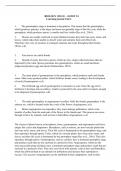
The gametophyte stage is dominant in bryophytes.
The gametophyte stage is dominant in bryophytes. This means that the gametophyte, which produces gametes, is the larger and more recognizable stage of the life cycle, while the sporophyte, which produces spores, is smaller and less visible (Rye at el., 2016). Mosses are usually restricted to moist habitats because they lack true roots, stems, and leaves, which make them unable to absorb water and nutrients from soil effectively. Therefore, they rely on moisture to transport nutrients and water ...
- Package deal
- Other
- • 2 pages •
The gametophyte stage is dominant in bryophytes. This means that the gametophyte, which produces gametes, is the larger and more recognizable stage of the life cycle, while the sporophyte, which produces spores, is smaller and less visible (Rye at el., 2016). Mosses are usually restricted to moist habitats because they lack true roots, stems, and leaves, which make them unable to absorb water and nutrients from soil effectively. Therefore, they rely on moisture to transport nutrients and water ...
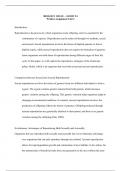
Comparison between Sexual and Asexual Reproduction
Reproduction is the process by which organisms create offspring, and it is essential for the continuation of a species. Reproduction can be achieved through two methods, sexual and asexual. Sexual reproduction involves the fusion of haploid gametes to form a diploid zygote, while asexual reproduction does not require the formation of gametes. Some organisms use both forms of reproduction during different stages of their life cycle. In this paper, we will explore the of the freshwater polyp, H...
- Package deal
- Other
- • 3 pages •
Reproduction is the process by which organisms create offspring, and it is essential for the continuation of a species. Reproduction can be achieved through two methods, sexual and asexual. Sexual reproduction involves the fusion of haploid gametes to form a diploid zygote, while asexual reproduction does not require the formation of gametes. Some organisms use both forms of reproduction during different stages of their life cycle. In this paper, we will explore the of the freshwater polyp, H...
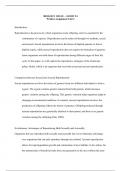
Comparison between Sexual and Asexual Reproduction
Reproduction is the process by which organisms create offspring, and it is essential for the continuation of a species. Reproduction can be achieved through two methods, sexual and asexual. Sexual reproduction involves the fusion of haploid gametes to form a diploid zygote, while asexual reproduction does not require the formation of gametes. Some organisms use both forms of reproduction during different stages of their life cycle. In this paper, we will explore the of the freshwater polyp, H...
- Package deal
- Other
- • 3 pages •
Reproduction is the process by which organisms create offspring, and it is essential for the continuation of a species. Reproduction can be achieved through two methods, sexual and asexual. Sexual reproduction involves the fusion of haploid gametes to form a diploid zygote, while asexual reproduction does not require the formation of gametes. Some organisms use both forms of reproduction during different stages of their life cycle. In this paper, we will explore the of the freshwater polyp, H...

The touch reaction in Mimosa pudica plants, often known as the "sensitive touch response," is one of the most remarkable instances of how plants have evolved different systems to respond to environmental stimuli.
The touch reaction in Mimosa pudica plants, often known as the "sensitive touch response," is one of the most remarkable instances of how plants have evolved different systems to respond to environmental stimuli. When the leaves of a Mimosa pudica plant are touched or disturbed, they fold inward and droop downward, as if the plant is "shy" or trying to protect itself from harm. This response is known as thigmonasty, and it is thought to be an adaptive mechanism that helps the plant defend it...
- Package deal
- Other
- • 1 pages •
The touch reaction in Mimosa pudica plants, often known as the "sensitive touch response," is one of the most remarkable instances of how plants have evolved different systems to respond to environmental stimuli. When the leaves of a Mimosa pudica plant are touched or disturbed, they fold inward and droop downward, as if the plant is "shy" or trying to protect itself from harm. This response is known as thigmonasty, and it is thought to be an adaptive mechanism that helps the plant defend it...

One specific ecosystem where human intervention has significantly altered it is the Amazon rainforest.
One specific ecosystem where human intervention has significantly altered it is the Amazon rainforest. Before human intervention, the Amazon rainforest was a vast, biodiverse tropical forest covering approximately 5.5 million square kilometers across South America (Rainforest Foundation US, 2023). It was home to countless species of plants, animals, and microorganisms and played a crucial role in regulating the Earth's climate by absorbing carbon dioxide and releasing oxygen. Indigenous communi...
- Package deal
- Other
- • 2 pages •
One specific ecosystem where human intervention has significantly altered it is the Amazon rainforest. Before human intervention, the Amazon rainforest was a vast, biodiverse tropical forest covering approximately 5.5 million square kilometers across South America (Rainforest Foundation US, 2023). It was home to countless species of plants, animals, and microorganisms and played a crucial role in regulating the Earth's climate by absorbing carbon dioxide and releasing oxygen. Indigenous communi...
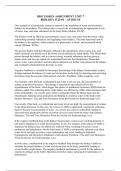
One example of a homeostatic system in animals is the regulation of water and electrolyte balance by the kidneys.
One example of a homeostatic system in animals is the regulation of water and electrolyte balance by the kidneys. The kidneys play a crucial role in maintaining the appropriate levels of water, ions, and other substances in the body fluids (Molnar, 2015b). The kidneys work by filtering waste products, excess ions, and water from the blood, while reabsorbing essential substances and regulating water balance. The main functional unit of the kidney is the nephron, which consists of a glomerulus, a...
- Package deal
- Other
- • 2 pages •
One example of a homeostatic system in animals is the regulation of water and electrolyte balance by the kidneys. The kidneys play a crucial role in maintaining the appropriate levels of water, ions, and other substances in the body fluids (Molnar, 2015b). The kidneys work by filtering waste products, excess ions, and water from the blood, while reabsorbing essential substances and regulating water balance. The main functional unit of the kidney is the nephron, which consists of a glomerulus, a...
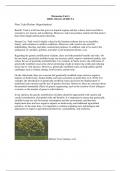
Plant: Teak (Phylum: Magnoliophyta)
Benefit: Teak is a tall tree that grows in tropical regions and has a dense, hard wood that is resistant to rot, insects, and weathering. Moreover, teak trees produce natural oils that protect them from fungal and bacterial infections. Human Use: Teak wood is highly valued in the furniture industry due to its durability, beauty, and resistance to outdoor conditions. Moreover, teak wood is also used for shipbuilding, flooring, and other construction purposes. In addition, teak oil is used in the...
- Package deal
- Other
- • 2 pages •
Benefit: Teak is a tall tree that grows in tropical regions and has a dense, hard wood that is resistant to rot, insects, and weathering. Moreover, teak trees produce natural oils that protect them from fungal and bacterial infections. Human Use: Teak wood is highly valued in the furniture industry due to its durability, beauty, and resistance to outdoor conditions. Moreover, teak wood is also used for shipbuilding, flooring, and other construction purposes. In addition, teak oil is used in the...

Which ions are being produced by this process, assuming that each of the chemical compounds dissociate into their constituent parts once they are dissolved in water
Preparation of the correct buffer is key to any good biological experiment and it is important that you understand how to calculate the mass of each chemical required to make that buffer and what the resulting concentration of those constituents will be in moles per litre.
- Package deal
- Other
- • 5 pages •
Preparation of the correct buffer is key to any good biological experiment and it is important that you understand how to calculate the mass of each chemical required to make that buffer and what the resulting concentration of those constituents will be in moles per litre.
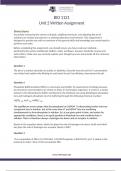
The pH of a solution describes its acidity or alkalinity
Phosphate Buffered Saline (PBS) is a commonly used buffer for experiments in biology because its pH and ion concentrations are similar to those in mammalian organisms. It works in a similar fashion to the blood plasma buffer mentioned in the textbook, but using dihydrogen phosphate ions and hydrogen phosphate ions for buffering through the following chemical reaction: H2PO4- (aq) ⇆ H+ (aq) + HPO42--(aq)
- Package deal
- Other
- • 5 pages •
Phosphate Buffered Saline (PBS) is a commonly used buffer for experiments in biology because its pH and ion concentrations are similar to those in mammalian organisms. It works in a similar fashion to the blood plasma buffer mentioned in the textbook, but using dihydrogen phosphate ions and hydrogen phosphate ions for buffering through the following chemical reaction: H2PO4- (aq) ⇆ H+ (aq) + HPO42--(aq)
